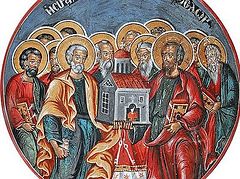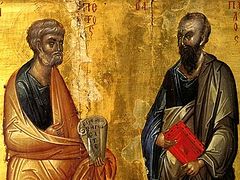In the name of the Father, and of the Son, and of the Holy Spirit.
Dear brothers and sisters, today we are celebrating the feast of the Synaxis of the Twelve Apostles—the closest disciples who served Christ, and were witnesses of His preaching, His miracles, and His healings. They were also witnesses of the Passion that the Lord voluntarily took upon Himself through evil people. They were also witnesses of the Savior’s death on the Cross. But they saw His glorious Resurrection and Ascension to God the Father as well.
And today, commemorating them, we will reflect on the subject: “What is apostolic service?” We note that it differs from all other types of service in the Church, both priestly and the lay ministry. Apostolic service is a direct response to God’s call to the work of preaching the Gospel, and it is fraught with many difficulties and trials. Apostolic ministry is associated with a Christian concentration on only the things that the Lord transmits to us through the grace of the Holy Spirit and puts into human mouths.
Having received the gift of the Holy Spirit on the day of Pentecost, the Apostles went all over the world preaching the Word of God. Their preaching on the Risen Christ, the Last Judgment and the need to repent and improve our lives spread across the globe quickly. Christ became known not only within Asia Minor, but also in Africa, in Europe, and even in Russia. Legend has it that the holy Apostle Andrew the First-Called reached as far as Novgorod where he preached. Many hundreds, thousands and millions of people became Christians.
The work of apostolic preaching has also been partially realized in our time, when, taking on apostolic mission, the clergy spread the Word of God among people. But at different times people perceived the Good Tidings of Christ in different ways. In many ways the success of preaching depends on which preacher addresses people and whether he is able to convey the Word of God to them. But the power of preaching also depends on the ability of people to hear the Voice of God through a preacher.
At different times in Russian history, we observe how people stop following the Gospel commandments and turn away from Christ and His Holy Church. When a nation is not ready to hear the Word of God, there is mass abandonment of the Church, and therefore of Christ. And then social upheavals, spiritual impoverishment and an increase in crime rates become the natural result. At the same time, it largely depends on ourselves whether we will hear the Word of Christ in our days or become like the possessed Gadarenes, about whom we have read today in the Gospel of Matthew, or worse still, like the Gergesenes who asked Christ to leave their country. They were not ready to meet Christ.
Dear brothers and sisters, so do we when we are busy with something else, but not with our salvation, when we are only preoccupied with worldly affairs, when our human nature is darkened by sin and our hearts are full of evil, hatred, envy and judging, then we are unprepared to meet Christ and so ask Him to leave us.
This is the reality of our lives, because there are very few believers who identify themselves as such and come to churches of God. Over 300,000 people live in the city of Smolensk, but only several thousand people apparently attend churches of God on Sundays. Where are the other hundreds of thousands? Do they care about the salvation of their souls? Do they think seriously about goodness, truth and the meaning of life?...
Not all hearts are ready to accept Christ. Many of us, like the people of the Gergesene country, ask Christ to pass by and not enter our homes. This is a terrible proof of our lack of spirituality. In the Epistle to the Romans, which we have read today, the Apostle Paul said that many are not able to perceive the truth of God. And that is true. Many people only want to hear gossip and about conflicts; they are only interested in church scandals, but not in the issues related to the salvation of their souls.
Let us pray to the Lord that He will give us strength, that we will understand the Holy Scriptures and everything that happens during the Divine Liturgy, that He will put into our hearts the ability to distinguish evil from the truth of God so that we can be strengthened by the power of the Holy Spirit in our lives, including outside the church walls. We must also pray for all those who did not deem it necessary to come to church today that the Lord will visit them, bring them to reason and give them the opportunity to repent and mend their ways. This is the power of collective prayer, when we pray not only for ourselves, but “for peace throughout the whole world, for the welfare of the holy churches of God and for the union of them all.” This is our Christian mission—to pray for ourselves, our neighbors and our Fatherland that the Lord will enlighten our government and strengthen our armed forces,1 and that by common efforts, kneeling before the Lord, we will become worthy of God’s Mercy. May the Lord protect us all through the prayers of the holy Apostles! Amen.





